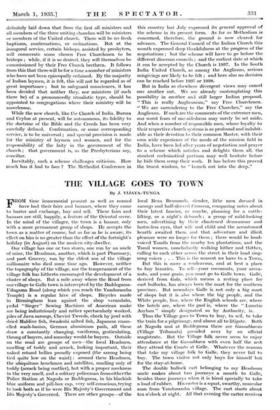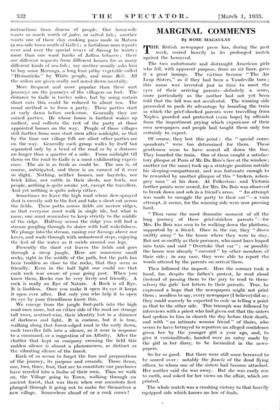THE VILLAGE GOES TO TOWN By J. VIJAYA-TUNGA F ROM time
immemorial peasant as well as nomad have had their fairs and bazaars, where they came to barter and exchange, buy and sell. These fairs and bazaars are still, happily, a feature of the Oriental scene. In the mind of the villager, the town is a bazaar, only with a more permanent group of shops. He accepts the town as a matter of course, but as far as he is aware, its effect on him is no greater than the effect of the fortnight's holiday On August) on the modern city-dweller.
Our village has one or two stores, one run by an uncle of mine, the Headman, another, which is part Pharmacy, and part 'Grocery, run by the eldest son of the village millionaire 'who died some time ago. However, neither the topography of the village, nor the temperament of the village folk has hitherto encouraged the development of a cluster of shops. But a mile away where the Road from our village to Galle town is intercepted by the Baildegama- Udugama Road (along which you reach the Vanduramba Temple) is a regular hive of shops. Bicycles made in Birmingham lean against the shop verandahs, pedal "Singer" Sewing Machines of American make are being industriously and rather spectacularly worked, piles of Java sarongs, Cheviot Tweeds, cheek by jowl with dried Maldive fish, Swadeshi salted fish, Japanese enam- elled wash-basins, German aluminium pails, all these draw a constantly changing, vociferous, gesticulating, throng of buyers, and someday would-be buyers. Outside on the road are groups of men—the local Headmen, smelling of toddy and arrack, looking important, their naked rotund bellies proudly exposed (the sarong being tied quite low on the waist) : around these Headmen, the ubiquitous henchmen and satellites, smelling only of toddy (arrack being costlier), but with a proper meekness in the very smell, and a solitary policeman from either the Police Station at Nagoda or Baddegama, in his blackish blue uniform and pill-box cap, very self-conscious, trying to look both as if he were His Majesty's Government and His Majesty's Governed. There are other groups—of the local Beau Brummels, slender, lithe men dressed in sarongs and half-sleeved Cameesa, comparing notes about their latest fancies, or maybe, planning for a cattle- lifting, or a night's debauch ; a group of mild-looking men, advertising by their chastened demeanour and lustre-less eyes, that wife and child and the accustomed hearth awaited them and that adventure and illicit pleasure were no longer for them ; there would be loud- voiced Tamils from the nearby tea plantations, and the Tamil women, nonchalantly walking hither and thither, calling to each other across the street in their loud sing- song voices . . . This is the nearest we have to a Town.
But this is more a rendezvous, and at best a place to buy luxuries. To sell—your cocoanuts, your areca- nuts, and your grain, you must go to Galle town. Galle, derived from Gala, - which means a resting place for cart bullocks, has always been the mart for the southern province. But nowadays Galle 'is not only a big mart of shops but it is also where the big people, and the White people, live, where the English schools are, where the hotels are, where the gaol is, where the " Lunatic Asylum " simply designated so by Authority, is.
Thus the Village goes to Town to buy, to sell, to take the train for a pilgrimage, and above all to litigate. Both -at Nagoda and at Baddegama there are GansabhavaS (Village Tribunals) presided over by an official magistrate. But the Village folk never seem to enjoy attendance at the Gansabhava with even half the zest they attend the Courts at Galle. Whatever the reasons that take my village folk to Galle-, they never fail to buy. The town visitor not only buys for himself but for the stay-at-home. • The double bullock cart belonging to my Headman -uncle /flakes about two journeys a month to Galle, besides those journeys when it is hired specially to take a load of rubber. His carter is a squat, swarthy, muscular man from Vanduramba village. The cart starts about ten o'clock at night. All that evening the carter receives instructions from dozens of people. One housewife wants so much worth of jadee, or salted fish ; another wants one of those clay cooking pans made in Matara (a sea-side town south of Galle) ; a fastidious man repeats over and over the special weave of Sarong he wants ; more than one want hanks of Jaffna tobacco ; there arc different requests from different houses for as many different kinds of sea-fish ; my mother usually asks him to buy some Murunga, a long lean pithy vegetable called "Drumsticks" by White people, and some Beli. All the orders are given orally and noted down mentally.
More frequent and more popular than these cart journeys are the journeys of the villagers on foot. The distance to Galle is twelve miles, :but by using certain short cuts this could be reduced to about ten. The usual method is to form a party. These parties start at early dawn before cock-crow. Generally they are mixed parties. He whose house. is furthest wakes upearliest, and collects the rest of the party at those appointed houses on the way. People of those villages still further from ours start soon after midnight, so that by the time our village folk are afoot other parties are on the way. Generally each group walks by itself but separated only by a bend of the road or by a distance no longer than a quarter of a mile. From midnight till dawn on the road to Galle is a most exhilarating experi- ence. The air is as fresh as could be. The sun is, of course, anticipated, and there is an earnest of it ever so slight. Nothing, neither houses, nor hayricks, nor brick kilns, nor cattle in their sheds, nor fowls, nor people, nothing is quite awake yet, except the travellers. And yet nothing is quite asleep either.
Sometimes we leave the high road whose dew-sprayed dust is sweetly soft to the feet and take a short cut across the fields. These paths across fields are narrow ridges, so that everyone must walk in single file, but what is more, one must remember to keep strictly to the middle of the ridge. Halfway across the ridge you will find a stream gurgling through its sluice with half wakefulness. We plunge into the stream, raising our Sarongs above our knees, and wade through with unhastened steps, enjoying the feel of the water as it swirls around our legs.
Presently the short cut leaves the fields and goes through a steep jungle. Here are numerous small rocks, right in the middle of the path, but the path has been trodden so close to the rocks, that they seem so friendly. Even in the half light one could see that each rock was aware of your going past. When you know them, Rocks can be very lively and friendly. A rock is really an Eye of Nature. A Rock is all Eye. It is limbless. Once you make it open its eye it keeps it open ever after. But only you who help it to open its eye by your friendliness know this.
We emerge from the jungle 'foot-path into the high road once more, but on either side of the road are strange tall trees, sentinel-wise, their identity lost in a shimmer of darkness and light. It is .curious, but it is true, walking along that forest-edged road in the early dawn, each traveller falls into a silence, as it were in response to a command, or a suggestion of an Affinity. After the chatter that kept us company crossing the field this sudden silence is almost a phenomenon, as distinct as the vibrating silence of the forest.
Each of us seems to forget the fuss and .preparations of the journey, its purpose and errands. Those items, one, two, three, four, that are to constitute our purchases have receded into a limbo of their own. Thus walk on, the Village going to Town,- walking through an ancient forest, that was there when our ancestors first plunged through it going out to make for themselves a new village. Somewhere ahead of us a cock crows !



























































 Previous page
Previous page